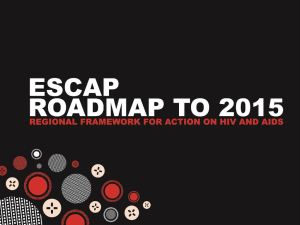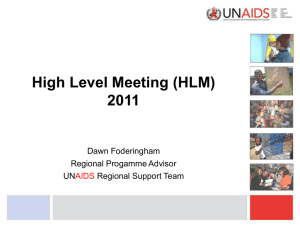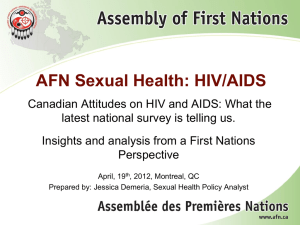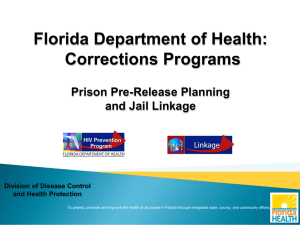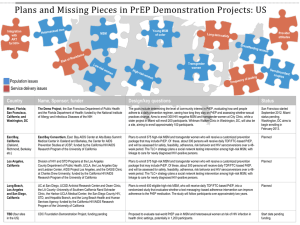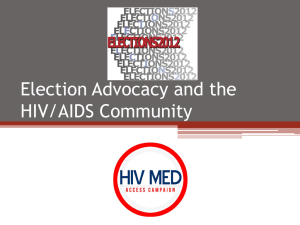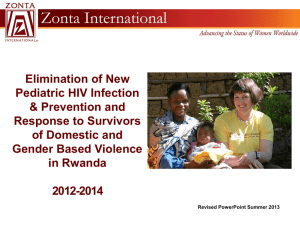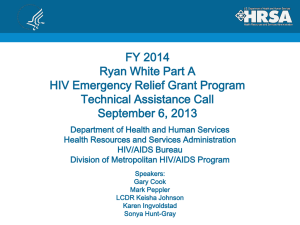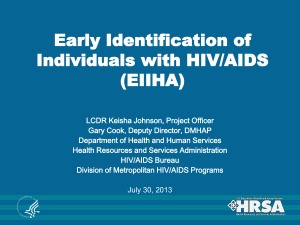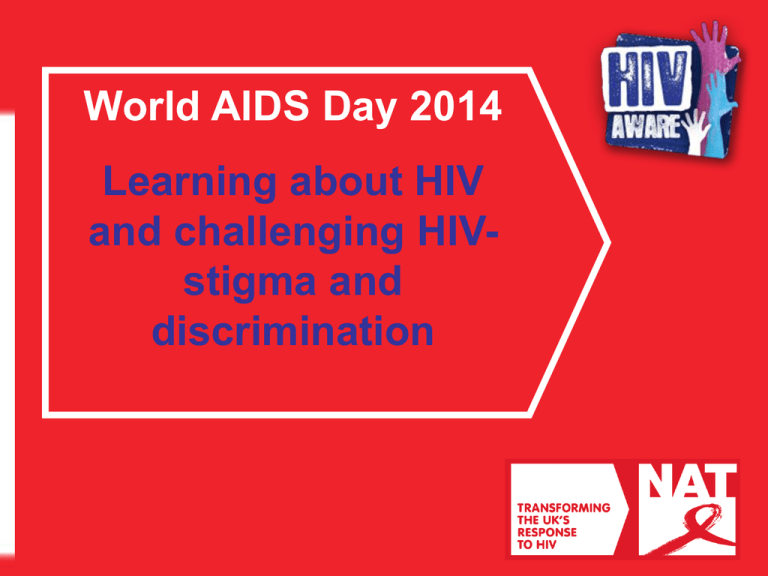
World AIDS Day 2014
Learning about HIV
and challenging HIVstigma and
discrimination
World AIDS
Day 2014
What is World AIDS Day?
World AIDS Day (WAD) is observed on 1st
December every year to help raise
awareness about HIV. It is a day to show
support for people living with HIV,
remember those who have lost their lives
because of HIV, and learn the facts and
realities of HIV in the UK today.
What do
we know
about HIV?
What is HIV?
HIV is a virus that attacks the body's
immune system. It stands for Human
Immunodeficiency Virus (HIV).
AIDS can develop when HIV damages
the immune system to such an extent
that it can no longer fight off a range of
infections it would normally cope with.
What do
we know
about HIV?
Who gets HIV?
Anyone can potentially contract HIV if they put
themselves at risk.
The most common way HIV is transmitted in the UK is
through sex without condoms. Condoms with lubrication
are very effective at preventing the transmission of HIV.
In the UK the groups most affected by HIV are gay and
bisexual men and black African men and women.
Some young people will have lived with HIV their whole
life because HIV can be passed on during pregnancy,
birth or breast feeding. However, in the UK this is now
very rare because HIV medication is used to prevent this
from happening.
What do
we know
about HIV?
What is life like with HIV?
If diagnosed in good time, and with the right
medication, people living with HIV can now live as long
as anyone else and will be unlikely to develop AIDS.
With the right medication, people living with HIV are
very unlikely to pass on the virus to anyone else.
In the UK, people living with HIV can do any job, apart
from serving on the ‘front-line’ in the armed forces. This
is the same for many other long-term conditions which
require you to take daily medication.
Some HIV statistics
Around 100,000 people are living with HIV in the
UK.
One in five people living with HIV in the UK do
not know they have the virus.
Just under half of adults who get HIV are
diagnosed late. Late diagnoses can cause
complications and even shorten your life
expectancy.
Myth
Busting
HIV myths
Myth
Busting
How is HIV passed on?
“You can get HIV through sharing toothbrushes, kissing,
or touching.”
Why is this untrue?
Because: HIV is only passed on through bodily fluids
exchanged through sex, and blood and breast milk.
There is absolutely no risk of contracting HIV through
sharing toothbrushes, kissing or touching because
HIV cannot be passed on through saliva or casual
day-to-day contact.
Myth
Busting
How do I protect myself from HIV?
“There is nothing I can do once I’ve been exposed
to HIV.”
Why is this untrue?
Because: You can take Post Exposure
Prophylaxis (PEP). PEP involves you taking 4
weeks of HIV medication and can prevent HIV
infection, if started within 72 hours.
Myth
Busting
Who gets HIV?
“I’m not the ‘type of person’ who gets HIV I’m not gay.”
Why is this untrue?
Because: Anyone can get HIV if they put
themselves at risk.
Myth
Busting
What is life like with HIV?
“If you get HIV you will not have much longer to live.”
Why is this untrue?
Because: Whilst HIV is a serious long-term condition,
it can now be treated and managed very well. If you
are diagnosed in good time and take your
medication as prescribed, your quality of life and life
expectancy can be just the same as anyone else.
HIV stigma
HIV and
Stigma
Myths and poor
understanding have reallife consequences.
As a result of myths and poor
understanding about HIV, people living
with HIV often experience stigma or
discrimination.
HIV and
Stigma
Stigma
‘A mark of disgrace associated with a
particular circumstance, quality, or person’
(Oxford English Dictionary)
HIV and
Stigma
Discrimination
‘The unjust or prejudicial treatment of
different categories of people, especially on
the grounds of race, age, or sex’
(Oxford English Dictionary)
HIV and
Stigma
What impact do these myths have on
Craig, John, and Sarah?
Think about:
What we’ve learnt so far about the
facts and myths of HIV.
Unfair stereotypes people hold about
certain groups of people.
Craig
Craig is a popular and loud boy at
school. He mainly has female friends
and he likes to discuss fashion with
them. The other boys start a rumour
that he is gay and he has HIV.
What myths can you identify?
Why is this untrue?
What are the potential consequences ?
John
John is 5 and applying for a new
school. His mother informs the
head teacher that he is HIV
positive. The head teacher is
concerned that John could pass
on the virus to the other children.
She tells John’s mother that he
cannot join the school.
What myths can you identify?
Why is this untrue?
What are the potential consequences ?
Sarah
Sarah is 17 at college and
has recently been
diagnosed with HIV. She
discloses her status to her
careers counsellor. Her
careers counsellor tells
her there are certain jobs
she can no longer do like
being a doctor or a nurse.
What myths can you identify?
Why is this untrue?
What are the potential consequences ?
What Can
You Do?
Act Aware – find out the facts and
bust the myths. Get clued up at
http://www.hivaware.org.uk
Don’t Be A Bystander –
challenge HIV stigma and
discrimination when you hear it.
Become an HIV Activist – you
can also get involved in campaigns
and make a difference. Sign up here:
http://www.lifewithhiv.org.uk/hivactivists-network
What Can
You Do?
How to mark World AIDS Day 2014
Wear a red ribbon to show your support for people
living with HIV
Attend a World AIDS Day event. Events are listed
here: www.worldaidsday.org
Do something as a class or school to mark World AIDS
Day. For example, a red ribbon collection box, hold an
event like a red themed party, or get sponsored to do
something for NAT. For fundraising ideas:
http://www.hivaware.org.uk/fundraising/top-ideas.php


